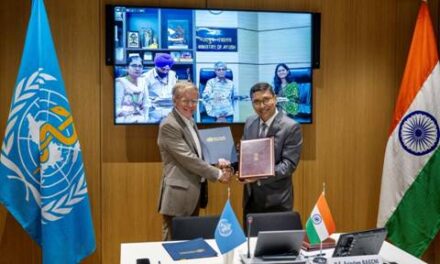Over 20 leaders, including ministers of health and energy, heads of international organizations and senior representatives from civil society institutions today endorsed a Strategic Roadmap on Health and Energy. The Roadmap identifies key steps to accelerate access to clean and sustainable energy for public health protection and serves as a call to action to increase commitments, mobilize resources and put enabling frameworks in place.
The document was endorsed at the first meeting of the High-Level Coalition on Health and Energy, convened by the WHO Director–General. The meeting provided the opportunity to kick-off high-level cooperation to identify concrete steps to promote clean cooking and electrification of healthcare facilities and to promote the role better energy access plays in achieving universal health coverage
The absence of clean and sustainable energy has a significant adverse impact on the health and livelihoods of the poorest populations. Energy is also linked to most current and potential future global issues such as gender, food security, clean water, public health, education, economic growth, empowerment of young people and women, and climate change.
Two principal areas where a call to action has been urgently needed: promoting clean fuels and technologies for cooking, and accelerating access to electricity for healthcare facilities.
Recent WHO estimates show that in 2019, 2.6 billion people were exposed to high levels of health-damaging pollutants due to the lack of access to clean fuels and technologies for cooking. This causes up to 4 million deaths annually from noncommunicable diseases such as heart disease, stroke, cancers, chronic lung disease as well as pneumonia. The use of inefficient and polluting cooking in households is a health risk for all, but it is a particularly important source of disease in women, children and infants.
At the same time, an estimated 1 billion people globally are still served by healthcare facilities without electricity. The COVID-19 pandemic has highlighted that , access to energy is essential for the functionality of critical medical devices and lifesaving appliances and ultimately the delivery of health care services.
To address these issues and to collectively identify pathways to accelerate action, said Dr Tedros Adhanom Ghebreyesus, WHO Director-General, convened the first face-to-face meeting of the High-Level Coalition on Health and Energy where the strategic roadmap was endorsed.
‘Accelerating electrification of healthcare facilities and clean cooking is essential to protect human health and to promote healthier populations. I am pleased to work together with other members of the High-Level Coalition on Health and Energy and all partners to dramatically move towards aggressively scaling up clean and sustainable energy solutions’, said Dr Tedros.
All Coalition members have confirmed their commitment to jointly accelerate much needed progress to improve public health through access to clean and sustainable energy.
A Strategic Roadmap was unanimously endorsed at the meeting, comprising, among
others, the following six actions and recommendations:
- Consider clean cooking and access to electricity in healthcare facilities 2 development priorities, essential to protect public health;
- Dramatically increase public and private investments in electrifying healthcare facilities and in clean cooking;
- Provide the necessary human and financial resources to design and implement clean energy plans and sustainable delivery models tailored to the needs of health sector and households;
- Develop tailored policy and financing schemes, able to unlock the potential of clean and sustainable energy solutions and to address the health sector needs;
- Increase cooperation between the energy and health sectors and collaboration with all relevant stakeholders;
- Facilitate collaboration between private, public, and non-governmental actors.
The objective of the High-Level Coalition on Health and Energy is to strengthen high-level cooperation between health and energy sectors, increase political momentum, spur investments, mobilize public support and drive practical solutions.
More details about the High-Level Coalition and its members can be found here.












